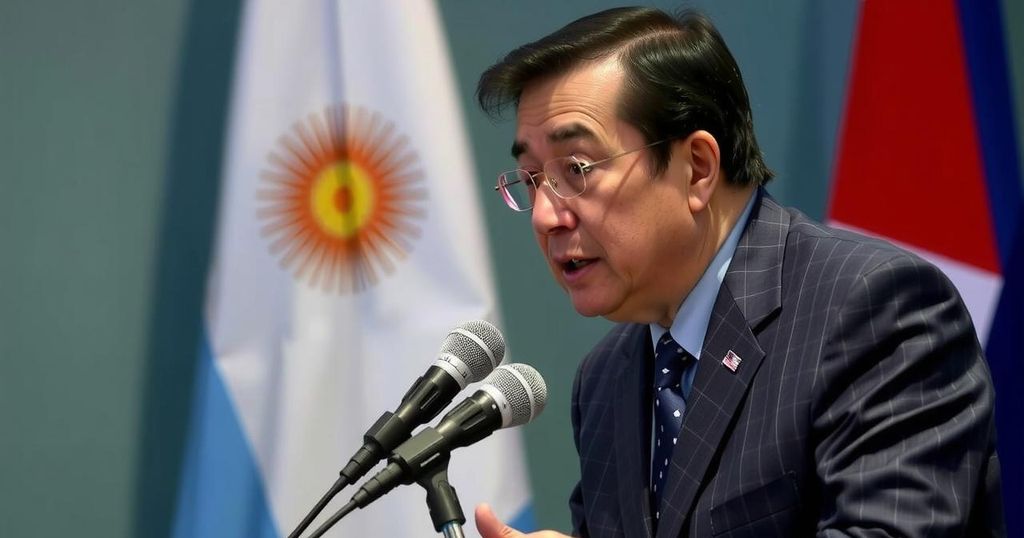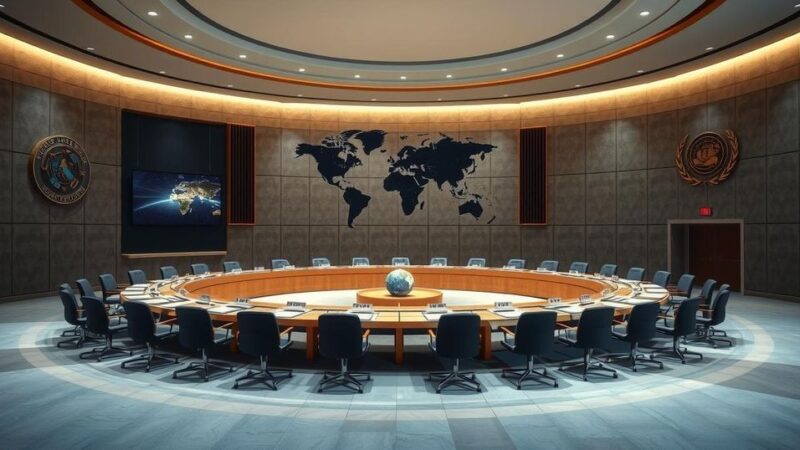Argentinian President Javier Milei terminated Foreign Minister Diana Mondino after the country supported a UN resolution advocating for the lifting of the U.S. embargo on Cuba. This decision marks a significant shift from Argentina’s previous foreign policy, which had supported Cuba, to a stance aligning with U.S. interests. Gerardo Werthein has been appointed as the new Foreign Minister to reflect this change, with an emphasis on opposing authoritarian regimes and promoting democratic values.
In a significant shift in foreign policy, President Javier Milei of Argentina dismissed his Foreign Minister, Diana Mondino, following the country’s support for a United Nations resolution that called for the lifting of the United States’ economic embargo on Cuba. During this voting, Argentina aligned with 186 other nations, while the United States and Israel were the sole opposers. This marked a notable deviation from previous foreign policy positions, particularly as it was the first instance of Argentina not siding with U.S. and Israeli interests since Milei assumed presidency. President Milei appointed Gerardo Werthein, the former ambassador to Washington, as the new Foreign Minister. Following this transition, the presidential office reiterated Argentina’s strong stance against the Cuban government, stating, “Our country is categorically opposed to the Cuban dictatorship.” This decision underscores a broader ideological shift and a commitment to upholding the principles of freedom and democracy, as evidenced by a statement from Milei’s administration that emphasized a foreign policy mission based on “freedom, sovereignty and individual rights that characterize Western democracies.” Historically, Argentina’s relationship with Cuba was nurtured under the preceding left-wing Peronist government, which advocated for the cessation of the U.S. embargo imposed in the 1960s amid Cuba’s shift towards communism. In return, Cuba supported Argentina’s claims to the disputed Falkland Islands, a contentious issue that arose following the brief but intense war between Argentina and Britain in 1982. Tensions within Milei’s administration had been growing in recent months, particularly between the president and the foreign ministry. Despite Mondino’s effectiveness in managing Argentina’s public image internationally, particularly in de-escalating tensions following controversial remarks by President Milei, her dismissal signifies a clear pivot in Argentina’s diplomatic stance. The U.S. trade embargo, initially instituted in 1962 to destabilize Fidel Castro’s socialist regime, has been a longstanding source of regional and international friction, as it has failed to achieve its primary goal of promoting democratic governance in Cuba.
The U.S. economic embargo on Cuba, first imposed in 1962, was a response to the Cuban Revolution, which saw Fidel Castro rise to power. The embargo aimed to compel Cuba to abandon its socialist regime and adopt capitalist values. Historically, Argentina had maintained a pro-Cuban stance, particularly under leftist administrations that sought to end the embargo. This relationship was underscored by Cuba’s allyship in Argentina’s territorial claims over the Falkland Islands, a conflict sparked by Britain in the 1980s. With Javier Milei’s recent ascension to the presidency, Argentina has experienced a marked shift towards Western alignment, notably distancing itself from previous policies supportive of Cuba.
President Javier Milei’s dismissal of Foreign Minister Diana Mondino reflects a significant ideological shift in Argentina’s foreign policy, aligning more closely with U.S. interests, particularly against the backdrop of the nation’s recent vote at the UN in favor of lifting the U.S. embargo on Cuba. This realignment not only alters diplomatic relationships but also signals stricter adherence to ideological principles that prioritize human rights and freedoms as delineated by Western democratic standards. Amid growing internal friction, this move may have wider implications for Argentina’s international standing and its relations with neighboring countries. The historical context of Argentina’s relationship with Cuba and the U.S. embargo further illustrates the complexity of these diplomatic shifts.
Original Source: www.bbc.co.uk






